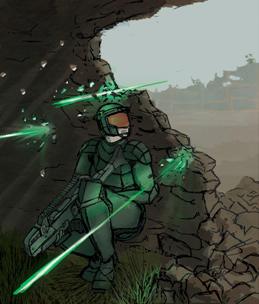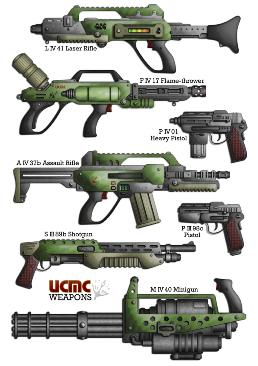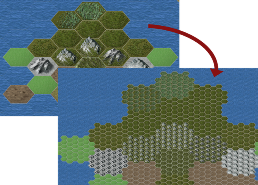Two Interesting Roleplaying Kickstarters!


We interrupt normal programming to draw your attention to two roleplaying-related Kickstarter campaigns!
First we have a fast-paced Military SF Horror game.
Earlier this year at Conpulsion, I had the fun of playing the beta version of I Love The Corps. My son — 12 — and his mate — 13 — also had a go and loved it.
It’s a Military SF game with a feel that’s best described as 70s Military Space Opera or screen SciFi with a horror element — think Halo, Verhoven’s Starship Troopers, Babylon 5 or Aliens. This is not the super science far future war of, say, Ken McLeod’s Corporation Wars.
Rather, this is the kind of game where Special Forces in powered armour exchange laser fire on the surface of Mars, while ground support drops combat trucks reminiscent of Warthogs.
The rules nicely balance story simulation with tactical gaming — there are the usual points you can exchange for stunts and stunning escapes, but ultimately the dice are a harsh mistress… which lends an edge to the experience.
Not only is action structured around cinematic scenes and montages, the mechanics support it! There is a neat system for automatic ability check scores when doing something in what I would think of as narrative summary. Characters can also satisfyingly rampage through low powered NPCs. Most of what you need is on the character sheet. The end result is fast-paced but substantial.
Go check out the Kickstarter page and take a look at the more detailed material there.
Next we have mapping software.
A couple of years back I reviewed Hexographer, which I thought was imperfect, but still best of breed if you wanted to tinker and create rather do CAD. Now they have Hexographer 2 : Worldographer in the pipeline.

It’s intended as both a technical and aesthetic update on the original, working on Windows 64-bit, Mac OSX & Linux.
However, what interests me is that it’s promising to be powerful creativity tool for those of us who need to create and then manage fantasy worlds.

Significant features include: linked parent and child maps, i.e. you can drill through from your world map to your regional map with updates working in both directions: built in support for icosohedral maps — the ones that look like exploded D20s; and the sorts of features you’d expect in ordinary graphics applications but which are usually inexplicably missing from fantasy mapping tools, e.g. Undo, drag and drop for text and features (most apps make this Pythonesque in its complexity); and simple notes.
This has the potential to be an application you can just lose yourself in while you spawn secondary worlds.
Inkwell Ideas have proven themselves capable of delivering an impressive range of roleplaying products, not just software but also dungeon dice and cards. If you are interested in map-making software, it might be worth your while to click through to their Kickstarter page and look at the features they are promising.
M Harold Page is the Scottish author of works such as Swords vs Tanks (Charles Stross: “Holy ****!”). For his take on writing, read Storyteller Tools: Outline from vision to finished novel without losing the magic. (Ken MacLeod: “…very useful in getting from ideas etc to plot and story.” Hannu Rajaniemi: “…find myself to coming back to [this] book in the early stages.”)
How’s Hexographer for mapping cities? If I wanted to put some bits in that had streets in grids, would it cope gracefully with that?
I think you want Cityographer for that. http://cityographer.com/